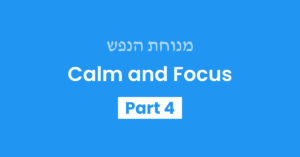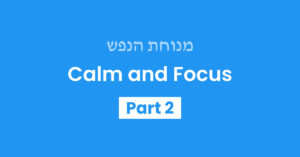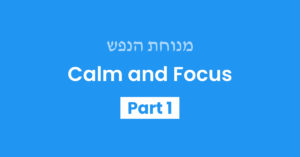In the past few weeks, we have been focusing on the middah of Menuchas Hanefesh. First, we explained that having Menuchas Hanefesh means to be fully focused on whatever we are doing. When we keep our minds focused fully on the present – not chewing over the past or worrying about the future – we will be better able to serve Hashem because we can concentrate on our brachos and pay attention to the mitzvos we are doing.
Next, we discussed how Shabbos is the source of all Menucha, because on Shabbos we give testimony to the fact that Hashem created the entire world and He is the only One who is continuing to make everything move and exist. Instead of feeling pressured to make money, meet clients, finish all my schoolwork, or run carpool, I can remember that Hashem only expects me to do my regular hishtadlus… but it’s not up to me to “make it happen.”
We can enter Shabbos every week with serenity, feeling as if “all our work is done” – because this is the truth! It’s not up to us to finish our work, rather it’s up to us to do hishtadlus and then calmly leave the rest up to Hashem.
Tefillah: A Time for Practicing Menuchas Hanefesh
Aside from having Menucha on Shabbos, another particularly important time to have Menuchas Hanefesh is during davening. Often, when we try to daven, our minds are still racing in a hundred different directions. We are thinking about where we need to go next, what we need to do tomorrow, or we are replaying a conversation we just had a few minutes ago… wondering what did he/she mean when he/she said that.
Although it’s so hard to focus on our davening, it is incredibly important to clear our minds before we talk to the Creator of the entire world!
How do we clear our minds and have proper Menuchas HaNefesh for tefillah?
How do we clear our minds and have proper Menuchas HaNefesh for tefillah?
The Gemara teaches us:1 : A person must be in a certain state of mind when he davens. He should not daven in a state of sadness, laziness, or lightheadedness. Rather, he should daven in a state of “Simcha Shel Mitzvah” (literally, “the joy of a mitzvah”).
The Sifsei Chaim2 points out that we can learn from here a fundamental truth. The Gemara didn’t say: “Before you daven, clear your mind from all sadness, laziness, and lightheadedness… and think about nothing at all.” Rather, it said: “Daven from a state of Simcha Shel Mitzvah.” Why?
We see from here a simple fact about how the human mind works. It’s impossible for the human mind to think about nothing at all. Our minds are always thinking, wondering, contemplating, and calculating.
It’s impossible for the human mind to think about nothing at all.
Try closing your eyes for a moment and thinking about nothing. If you pay close attention and are honest with yourself, you will see that you are always inevitably thinking about something. Maybe you are noticing your breathing, or imagining yourself with your eyes closed, or wondering how much time has passed since you started this exercise. Even while we are asleep, our minds are busy dreaming.
Therefore in order to enter a state of Menuchas Hanefesh for tefillah, it’s not enough to just tell yourself “Stop thinking about everything else!” Rather, we must actively choose to focus on something else instead, so that our minds will have something to grab onto.
We must actively choose to focus on something else instead.
What to Think About
What is it that we should think about instead? What is the best way to prepare ourselves for tefillah? The Gemeara revealed to us one answer: Focus on “Simcha Shel Mitzvah” (literally: “the joy of a mitzvah”). What does this mean?
Rashi3 explains that the Gemara means we should focus on “the comforting words of the Torah” and praises of Hashem, such as the pesukim we say in Ashrei: “Shomer Hashem Es Kol Ohavav – Hashem protects all who love Him”4.
Pesukei Dizimra – the passages we say in davening which lead up to Shemoneh Esrei – are filled with so many praises of Hashem and words of comfort. Each of the paragraphs beginning with “Hallelukah” speak of Hashem’s awesome greatness and kindness, and the pesukim in Ashrei reassure us that if we just call out to Hashem, He will come to save us, such as, “Karov Hashem Lechol Korav – Hashem is close to all those who call out to Him.”
If we would truly focus on all these comforting thoughts every day during Pesukei D’Zimra, explains the Sifsei Chaim, it would greatly strengthen our emunah and bitachon. All these verses would remind us that Hashem is in control of our lives, and we have nothing to worry about – just as a baby never has to worry, because he trusts that his mother will take care of all his needs. This emunah and bitachon will give us a greater sense of Menuchas HaNefesh, and then our hearts will be open and ready to beseech Hashem for all our needs in Shemoneh Esrei as we reach the end of davening.
We have nothing to worry about.
When the Gemara said that before davening Shemoneh Esrei, a person should focus on “Simcha Shel Mitzvah,” therefore, it means we should focus on these pesukim of comfort which gladden the heart and strengthen our Emunah and Bitachon. Through these thoughts, we will achieve a deep inner sense of peace and quiet, as our souls know that we can rest calmly in Hashem’s Hands, like a baby sleeping calmly in his mother’s arms. When we start Shemoneh Esrei, we can then feel calm trust in Hashem, and daven with a sense of Menuchas HaNefesh.
We can rest calmly in Hashem’s Hands, like a baby sleeping calmly in his mother’s arms.
This week, let’s practice focusing on this thought that Hashem is taking care of all our needs so that we can have the proper Menuchas HaNefesh when we say brachos and tefillos.
Sources: [1] Brachos 31a; [2] Sifsei Chaim, Middos V’Avodas Hashem Vol. II. pg. 42; [3] Rashi on Brachos 31a; [4] Tehillim 145:20
Your Challenge
Once a day, before saying a brachah or davening Shemoneh Esrei, pause and think: “Hashem is taking care of all my needs.” Then think of a specific need that Hashem is taking care of for you.
FOR EXAMPLE:
- Hashem is taking care of making sure I will have enough money.
- Hashem is taking care of making sure that I will get married at the right time.
- Hashem is taking care of making sure that my children will be as healthy as they are supposed to be.
- Hashem is taking care of making sure that I will get whatever grade on my test that is best for me to get.
Torah Questions
- Which of Yaakov’s sons was called “Pachaz Kamayim” (“unstable like water”) because he acted too impulsively, instead of thinking calmly before acting? (See Bereishis 49)
- Which word is used in Yirmiyahu 6:16 to refer to “rest”?
- What happened when Hashem told the Jewish People to follow in a better path that would provide more calm and peace for their souls? What did they answer? (See Yirmiyahu 6:16)
- In the times of Purim, on what date did the Jewish people in most of the cities (not Shushan) “rest” from their enemies? (See Esther 19)
- On what date did the Jewish people in the city of Shushan “rest” from their enemies? (See above)
- According to the Gemara (Eiruvin 65a), if a person’s mind is not settled, what activity should he avoid doing?
Questions to Ponder
- The Gemara says that Talmidei Chachamim have no Menucha (rest) in this world, nor in the World to Come. Why do you think that is? What does it mean? What is the Gemara trying to teach us?
- In Yaakov’s bracha to his son Yissachar, he said that Yissachar has the quality of Menucha because he carries the yoke of Torah. How could it be that learning Torah brings Menucha? Isn’t it hard to learn Torah? Does this contradict the previous Gemara in Question #1?
- It says in Yeshaya 57:20 that wicked people (Resha’im) never have any rest. Why do you think this is so?
- The Chochma U’Mussar writes that “there is no greater chessed (kindness) than Menuchah.” What do you think this means?





